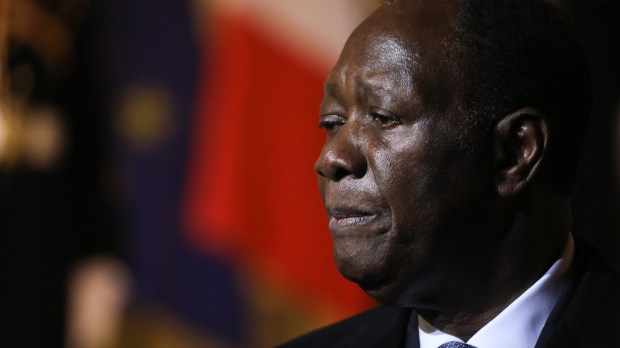Thursday 15 September 2022
~
1. Ivory Coast: President Alassane Ouattara to meet Pope Francis on September 17
2. The history of the Catholic Church dissected by The New York Times
3. The Head of the Order of Malta clarifies some issues
4. Ethiopian cardinal works for peace in Tigray
5. Oblates for the exclusion of Father Joannes Rivoire
~
1Ivory Coast: President Alassane Ouattara to meet Pope Francis on September 17
Next Saturday, Pope Francis will receive the President of the Ivory Coast, Alassane Ouattara, in a private audience at the Vatican. The last visit of the Ivorian president was in 2012. At that time, he was received by Benedict XVI, when his country was just emerging from a bloody crisis. Indeed, the presidential duel between President Ouattara and his rival, Laurent Gbagbo, had led to a post-election war that left 3,000 dead and resulted in the arrest of Gbagbo in April 2011. Ten years have passed and things have calmed down in the West African country, with the two former rivals even meeting again this summer for a “reunion.” However, the Catholic Church in the Ivory Coast, which was very active during the crisis of the early 2010s, remains vigilant. This article in French daily La Croix Africa reminds us that, although relations between the government and the Church are usually good, in 2020 there were some episodes of tension. The most notable example was when the Ivorian government spokesman criticized the episcopate after statements on the detention of political prisoners and prisoners of conscience, the fate of the reconciliation project and the compensation of victims. The article also recalls that Cardinal Jean-Pierre Kutwa, who was made a Cardinal in Pope Francis’ first consistory in 2014, had spoken out against the third candidacy of Alassane Ouattara in 2020. This statement was not well received at the time. It remains to be seen what Pope Francis will say to President Ouattara, who was re-elected in October 2020 with 95% of the vote.
La Croix, French
2The history of the Catholic Church dissected by The New York Times
A new book published on September 6 and titled “Catholicism: A Global History From the French Revolution to Pope Francis,” is considered by The New York Times to do a “remarkable job of explaining how the epic struggle between reformists and traditionalists has led us to the present moment in the Roman Catholic Church.” Written by an American historian, John T. McGreevy, the book makes “narrative sense of one of the most tumultuous periods in the history of the oldest institution in the Western world.” The NYT journalist analyzes that today the Church finds itself in possibly “its worst crisis ever,” due to the problems concerning sexual abuse, which have lead to a decline in the number of Catholics in certain regions. However, the book highlights how the Church is in fact “vibrant and growing” in the global South. The author of the article underlines how Pope Francis’ recent trip to Canada is an example of humility rooted in the Gospel, which “may be one reason the Catholic Church has remained so resilient in a world where it is usually three steps behind the times.” The book begins with the struggles the Church faced during the French Revolution. It then moves to the Church’s rocky relationship with emerging democracies between the 17th and 19th centuries. “It’s no surprise that a top-down, insular institution did not know what to make of government by the people,” the article explains. When moving to the Church in the 20th century, the NYT journalist suggested that McGreevy should have developed more the relation between fascism and the Church. The book then concludes with the revolution of Vatican II, where “rather than build a fortress against modernity, the Church would engage the world.”
The New York Times, English
3. The Head of the Order of Malta clarifies some issues
The Lieutenant of the Grand Master and Head of the Sovereign Military Order of Malta, Fra’ John T. Dunlap, gives a wide-ranging interview to clear up misunderstandings about the recent reform of the Order of Malta.
NCRegister, English
4. Ethiopian cardinal works for peace in Tigray
Following Ethiopian Cardinal Souraphiel’s call for dialogue and a cease-fire, members of the Tigrayan forces say they are ready to participate in peace talks under the mediation of the African Union.
ACI Africa, English
5. Oblates for the exclusion of Father Joannes Rivoire
The Oblates of Mary Immaculate have initiated a canonical procedure for the dismissal of a French-Canadian priest, accused of sexual assaults against young Inuits in the 1960s.
AFP, French

